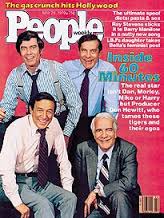The last few days have been tumultuous for my family and me – and filled with strong emotions.
But I wanted to say how much I appreciated all those who wrote in, via various media, with kind words, words of support and encouragement. Tens of thousands read the blogpost below. Thousands of people shared the post below on Facebook. Hundreds more tweeted it. I received many e
mails, and (now that my WordPress comments section is fixed) comments on my blog. Many folks wrote in on the 60 Minutes website and the show’s Facebook page to object.
It means so much that you would do that. Thank you!
“People can see the truth,” said one editor and friend. I think that’s probably right.
Journalists and writers sent me notes with their own tales of how 60 Minutes and other shows had taken their stories/books/articles/reports and redone them without giving credit.
“This has been going on for years,” said one.
Maybe, but that doesn’t make it right. I hope writers/reporters will speak up when this happens in the future.
I hope my public objection, calling them out, means that a show like 60 Minutes will think twice before it appropriates the work of others without giving them credit. Television in particular seems afflicted with the weakness for taking the stories of others.
To those who would do that, I say, fine. Just give credit. It’s common decency. Show the work the real reporters did. Show respect. Don’t pretend, as 60 Minutes did so brazenly, that you’re blazing some new trail.
All that show had to do was mention my name, my work, my book, and that I did indeed help them.
That seems unlikely now, given the comments of the show’s spokesman. Let me say for the record: I spoke up not to promote my book. I spoke up because I had to defend my work. Because if I didn’t defend my work, no one else would. 60 Minutes was profiting from my work. I spoke up because this was work that 60 Minutes had not done by themselves. I had and I did it when almost no one in the media cared about this issue; early on, some questioned my judgment for even getting into the topic. Who cares about heroin addiction?
I spoke up because we’re in a new world, where if you want to do good journalism you almost have to go independent. And if independent journalists are routinely, and with impunity, scavenged by predators without the interest or energy for doing the work themselves, then we are doomed.
I spoke up because 60 Minutes, while taking what I’d taught them in phone conversations and in Dreamland, displayed no interest in advancing the story, taking it new places, teasing out new angles. None of that. Just the “Cliff Notes,” as one retired cop told me, to my book.
After 30 years in this business, three books and more articles than I can count, I’m accustomed to seeing stories that I scooped get picked up by other news outlets. I barely flinch. It’s part of the job. It’s even happened with many news outlets since Dreamland appeared. Everyone seems to be talking about the heroin epidemic in the last six months. Time Magazine, New York Times, Sports Illustrated. That’s great, and one of the reasons I wrote the book.
I called out 60 Minutes because it was such an egregious violation.
They could have gone anywhere in the country and done this story. You’d have to ask them why they didn’t. I suspect they went to the place I told them to go (on the phone and in an email) and where a major part of Dreamland was set – Columbus, Ohio – because it was cheaper to do it that way, with the roadmap I provided them.
The night of the show, I was proud of the parents who were interviewed, several of whom I know. They spoke for millions of mothers and fathers like them across the country who have suffered this nightmare of watching their kids transformed into something like zombies under the influence of pills and now heroin. They pushed along this awakening regarding the opiate epidemic that has been gaining strength across the country in the last six months.
But I also found myself dumbfounded, then outraged as I watched, remembering all the work I’d put in on this topic, the time I spent away from my wife and daughter – all of which 60 Minutes just appropriated as if it belonged to them. After it was over, I apologized to my daughter for my outbursts during the show.
“You don’t have to be sorry, Daddy,” she said.
So I’m not.
But I am grateful. Thank you!




